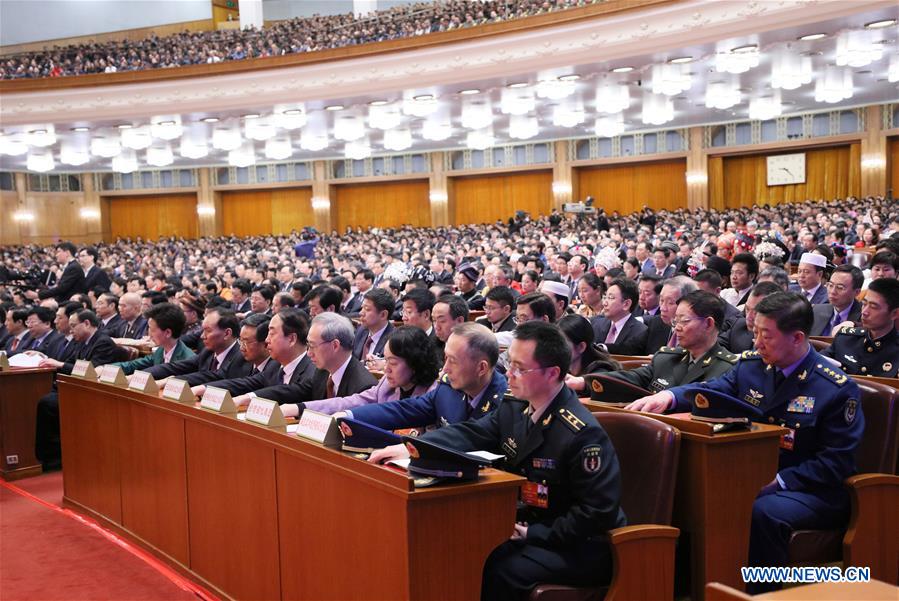
Deputies to the 13th National People's Congress (NPC) press buttons to vote at the closing meeting of the first session of the 13th NPC at the Great Hall of the People in Beijing, capital of China, March 20, 2018. (Xinhua/Liu Weibing)
BEIJING, March 20 (Xinhua) -- The Supervision Law was adopted by China's national legislature Tuesday, legalizing a more sophisticated and efficient anti-graft network.
The law was adopted at the first session of the 13th National People's Congress (NPC) through a vote after three readings.
Also at the session, Yang Xiaodu was elected director of the national supervisory commission that oversees local commissions at provincial, city and county levels.
"With the new law, the country will pool supervisory powers that used to be divided, and form a centralized, unified and efficient state supervisory system," said Professor Ma Huaide, vice president of the China University of Political Science and Law.
When explaining the draft law to lawmakers on March 13, Li Jianguo, vice chairman of the Standing Committee of the 12th NPC, said the supervision law, an essential part of China's reform of supervisory institutions, was expected to "serve as a fundamental and guiding law against corruption and for state supervision, aimed at enhancing the leadership of the Communist Party of China (CPC) on anti-corruption campaigns."
The law is a highlight in the reform of the supervisory system. A pilot reform began in Beijing, Shanxi and Zhejiang in December 2016, and then expanded nationwide in November 2017.
Existing supervisory, corruption prevention and control departments within governments and procuratorates were merged into the new supervisory commissions, which shared offices and staff with Party disciplinary inspectors.
In late February, local supervisory commissions were founded with their chiefs elected across the country.
"The new supervisory system serves as an important institutional tool to realize law-based governance and modernize state governance," Ma said.
NETWORK COVERING ALL
The new law entrusts supervision commissions to oversee staff of Party organs, legislatures, governments, courts, procuratorates, political advisory bodies, as well as their own staff, executives of state-owned enterprises, managing staff of public institutions and mass organizations, among others, in public office.
After the pilot reform, the number of state functionaries under effective surveillance has notably increased, in many places doubling and even tripling.
In Beijing, one of the three localities that started the reform first, the total number of officials under supervision increased from 210,000 before the reform to 997,000 as of December last year.
In the southern Chinese city of Guangzhou, a contractor of the local urban management agency named Yang Guilan was detained and found taking bribes worth of about 574,000 yuan (about 90,880 U.S. dollars).
Due to limited budgets, local governments and public services sometimes hire contractors like Yang, who serve in public office but not as formal civil servants. Not a Party member, Yang was unsupervised by either the Party disciplinary inspection agency or the administrative supervisory agency.
"Now people like him will not be able to escape punishment," said Zheng Baisheng, deputy director of the Baiyun district supervisory commission of Guangzhou.
MORE EFFICIENT, UNIFIED TASKFORCE
The new law integrates supervisory power that was divided among three agencies -- the Party disciplinary agencies, administrative supervisory agencies, and procuratorates.
Due to integration of different agencies, more officials were added to daily supervision and investigation. In Guangzhou, the number increased by 10 percent.
Officials with different backgrounds are expected to complement each other and improve efficiency.
Working for the corruption investigation division under a city procuratorate in southwestern Sichuan Province for more than 20 years, Long Yong said he was looking at his job from a more political perspective now.
"I not only care about taking the suspect to the court but also how to root up the source and prevent it from happening again," he said.
Meanwhile, a disciplinary inspector like Xu Caijin from southeastern Fujian Province is trying to be more competent in legal affairs.
"Before the reform we just needed to establish the facts and then handed the case over to prosecutors for judicial investigation. Now we need to think about whether the case can be taken to the court," he said.
RIGOROUSLY REGULATED
Under the new law, supervisory commissions have their power legally regulated and themselves supervised.
Clear protocols are established for supervision and investigation procedures, and provisions are included to better protect personal and property rights of those under investigation.
A new detention system will replaces the practice of "shuanggui," an intra-party disciplinary practice, exercised by Party disciplinary officials, where a Party member under investigation had to cooperate with questioning at a set time and place.
"Supervisory commissions will not be a super agency of power. They mostly serve to give warnings," said Yang Xiaodu in a group interview on the sidelines of the NPC session on March 5.